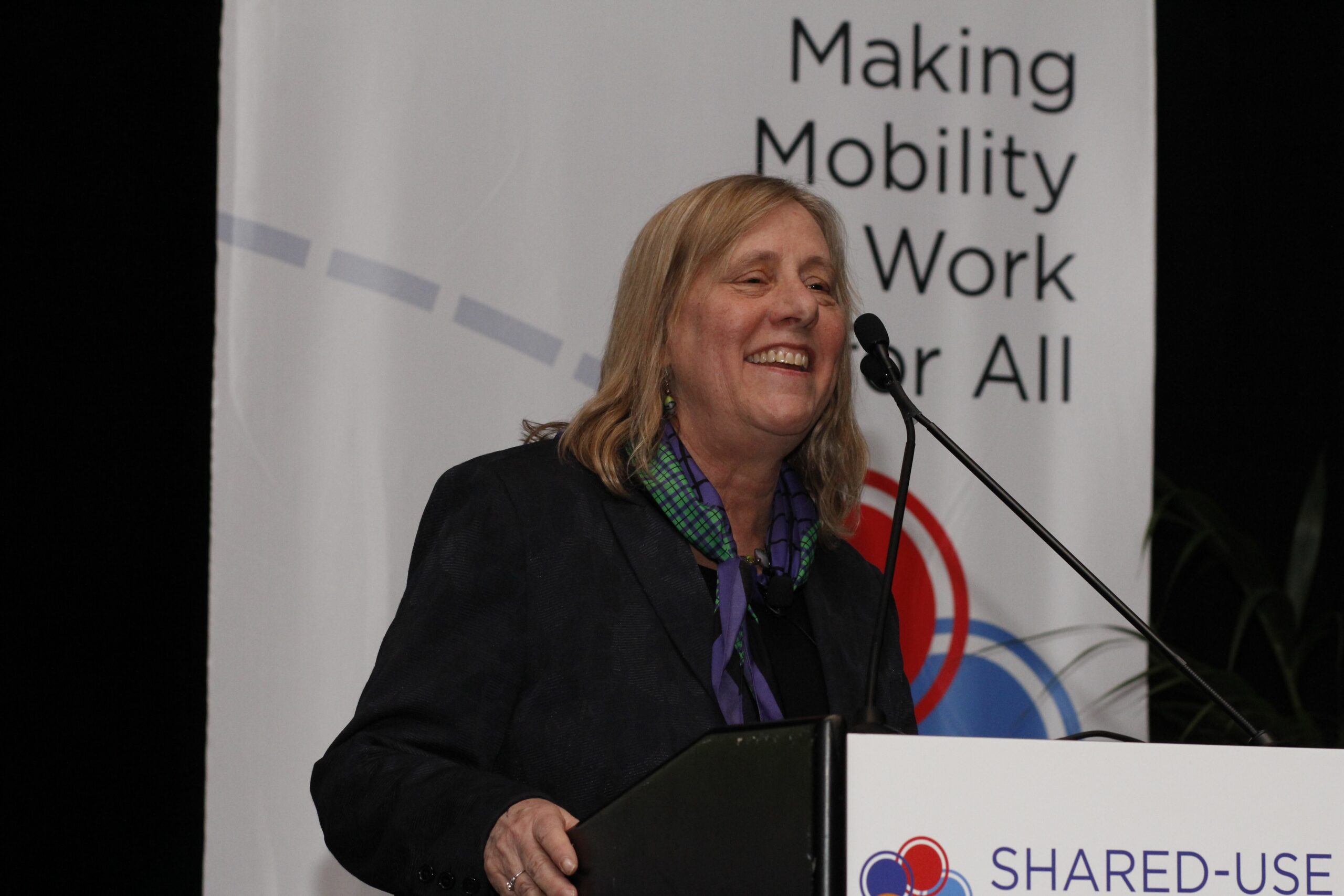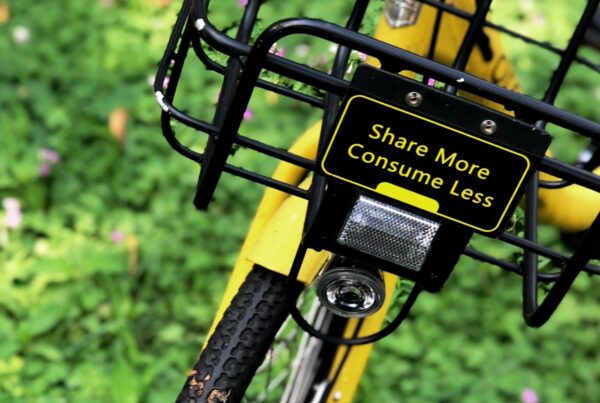Welcome to the Shared-Use Mobility Center’s weekly guide to the most impactful news, thought-provoking articles and innovative technologies that are shaping our transportation future. We believe in sharing information, just like sharing cars, bikes, and scooters, so if there’s anything additional you’d like to see, just drop us a line.
SUMC News and Announcements
A message from Founder and Executive Director Sharon Feigon
Dear Colleagues and Friends,
At the end of 2020, I will be stepping down as Executive Director and into a new role as Founder-in-Residence at the Shared-Use Mobility Center (SUMC). This new position will allow me to focus more deeply on some of the pressing transportation challenges facing our field while opening up an exciting opportunity for new leadership at SUMC.
In my new role as Founder-in-Residence, I will continue to strategically support SUMC and the field by providing the benefit of my years of experience and expertise. I plan to launch a project to address the urgent need for new big-picture approaches including public/private business models and financing strategies that can successfully support growing multimodal transportation for all.
Please follow the link in this paragraph to learn more about these plans. You’ll also find a job description and information that will help spread the word with friends and colleagues about the search we now have underway for SUMC’s next Executive Director, who will begin in January 2021.
Don’t hesitate to reach out if you have any questions about SUMC, my new role, or anything else. I look forward to staying in touch! Onward!
![]()

Fill up your calendar with Federal Transit Administration events
Stay in the know and connect with colleagues at roundtables, webinars, workshops, and more. View the calendar.
Mobility Justice
On Thursday, September 3, a vehicle was filmed driving through a crowd of people in Times Square during a Black Lives Matter protest. Although no serious or life-threatening injuries were reported, using a vehicle for the intentional harm of protestors in a public space is a horrific and telling trend that has gained alarming popularity for political extremist violence.
Janis Scott (aka the “Bus Lady” in the Houston transit community) not only spends her time advocating for affordable, accessible, robust public transit for Black and Brown neighborhoods, she is also a long-standing, transit-dependent rider that wants to see community-focused growth for equitable mobility during the ongoing COVID-19 era.
As cities grapple with containing a global pandemic and coming to terms with correcting decades of systemic racial injustice, we must collectively recreate the spaces that people interact with daily to communicate the resilience and strength of enduring communities. This, dubbed by London-based planning consultant Charles R. Wolfe, is ‘place-healing’.
Carden Wyckoff, a transit accessibility advocate in Atlanta who has a progressive muscle weakness disorder, reflects on the effect that the Americans with Disabilities Act had on public space and transit for people with disabilities, and what is yet to be done, as the law turned 30 this Summer.
Ridehailing/Carsharing/Carpooling
Uber is planning a green future with a new pledge to become a zero-emission operation by 2040, and with all rides taking place in electric vehicles in the US, Canada, and Europe by 2030.
And speaking of the ridehailing giant, they’re partnering with CarTrawler in the UK to offer car rental to boost their portfolio of options in the devastated COVID-19 economy. They already offer bike and scooter rentals in the United Kingdom.
The Jacksonville Transportation Authority and Go Tuk’n Inc. have teamed up to offer the company’s on-demand EV ‘Tuk Tuk’ service in the city’s downtown, Riverside, and Avondale areas, including ADA-accessible vehicles, to expand mobility options.
Set to launch next month, the Miami Parking Authority will be launching a free-to-use, on-demand ride service called Freebee that will use open-air EV shuttles to connect people in the city’s Central Business District to transit stops and local amenities for better first-last mile connections.
Bikesharing and Micromobility
Learn about the state of the micromobility industry in North America from NABSA’s latest report detailing comparisons and benchmarks of 292 cities, having a total of 194,000 shared vehicles, consisting of regular bikes, e-bikes, and e-scooters.
The Oregonian gives Biketowns’s shared pedal-assist e-bikes a whirl to test the new fleet of 500 launched for the system, relishing the boost that they offer over traditional, analog bikes (not without a few mishaps of course).
UK mobility company HumanForest looks to expand its free e-bikeshare service around London with a cool £1.8 million (~$2.3M) fund influx from ridehailing company Cabify.
Cycling and micromobility outfit Superpedestrian debuted its LINK scootersharing service in Brooklyn at an event at Brooklyn Navy Yard—and christened the occasion by donating 50 new bikes to essential healthcare and delivery workers in the Transportation Alternatives’ #BikeMatch program.
Transit
Houstonians have a new way of getting around with the launch of the curb2curb on-demand ride service courtesy of the city’s Metropolitan Transit Authority, filling in gaps for traditional transit networks.
Metro Transit in Minneapolis has extended its $1-fare program for low-income riders to people unemployed due to the COVID-19 pandemic in a bid to extend affordable, equitable public transportation options to those in need.
Senate Minority Leader Chuck Schumer and Rep. Jerry Nadler (D-NY) are pressuring the US Senate for a mass transportation lifeline to assist the nation’s largest public transit system, as New York’s Metropolitan Transportation Authority eyes layoffs and service cuts in Fall 2020.
Greater Greater Washington breaks down the proposed service-cut plan released by the Maryland Transit Administration for Baltimore that is set to go into effect next January, possibly leaving thousands to deal with missing lines and crucial transit gaps as the pandemic roils local travel.
Technology
Carbon Upcycling Technologies wants to make carbon the next raw material used for plastics, adhesives, concrete, lithium-ion batteries, consumer products, and much more to flip the deadly gas into a sustainable, emissions-beating tool, starting with a cutting-edge air filtration additive.
The call of Presidential candidate Joe Biden and other leaders for transportation industry electrification signals a much-needed focus on lowering vehicle emissions in the US, but the process of making the actual EV-batteries must be environmentally sound. Period.
Russian tech giant Yandex will be taking its autonomous vehicle joint venture with Uber into a brand new company and pumping $150 million into the business to pursue self-driving tech development.
The Connecticut Department of Transportation has unveiled new plans to introduce the first automated, heavy-duty public transit buses in North America, including three EV vehicles from New Flyer, to rollout in 2021 on the CTfastrak bus rapid transit guideway.
Sustainability
WEBINAR: The University of Illinois at Chicago Urban Transportation Center’s “Changes in Mobility Options and Patterns in the Wake of the COVID-19 Pandemic” on September 17 features the Chicago Metropolitan Agency for Planning, the Active Transportation Alliance, and Chicago Department of Transportation Commissioner Gia Biagi. Learn more and register.
When planners retrofit a street with “pedestrian-focused infrastructure”, does that still give cars the higher right of way priority while using performative design flourishes to appease walkers and cyclists? City Observatory works to dispel the myth of big “pedestrian” projects that only truly function to cater to car traffic.
Minneapolis’ political challenge to restrictive single-family zoning laws and parking minimums was heralded as a major success last year in creating a path forward for affordable and racially equitable housing options in the region. Yet one year later, only three triplexes have been built since the policy reform and Strong Towns believes the devil is in the underlying, codified details.
Onward to a cleaner future! The City of Chicago has released a Request for Proposals for a $200-million, five-year contract to run all city-owned buildings, streetlights, and facilities on renewable energy starting in 2022. Learn more on Smart Cities Dive and submit your proposal below.
Requests for Proposals, Inquiries, and Information
RFP: Specialized ADA Transportation Services
Southern Region Los Angeles County Access Services
Los Angeles, CA
Deadline: September 17, 2020
(Registration required)
RFP: Development of an RFP for a Statewide Mobility Services Program
New York State Department of Transportation
New York, New York
Deadline: September 21, 2020
RFP: Services for the Chestnut Street Multimodal Station, Shared Services Facility & City of Oxford Passenger Rail Platform
Butler County Regional Transit Authority
Oxford, Ohio
Deadline: October 19, 2020
NEW RFP: $200 Million For Renewable Energy Supplier for All City-Owned Buildings
City of Chicago
Chicago, IL
Deadline: November 6, 2020
Did someone forward this to you? Sign up for our newsletter here.



